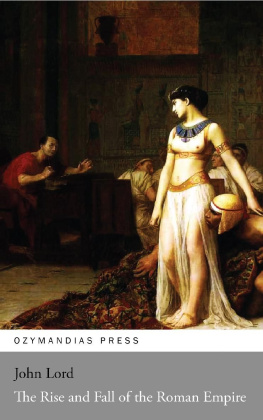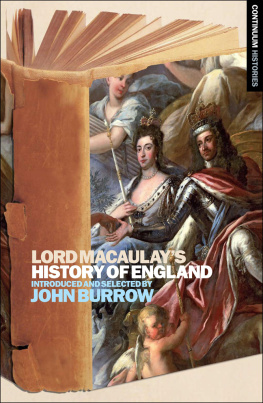John Lord - Beacon Lights of History, Volume 03
Here you can read online John Lord - Beacon Lights of History, Volume 03 full text of the book (entire story) in english for free. Download pdf and epub, get meaning, cover and reviews about this ebook. year: 2021, publisher: Independently Published, genre: Religion. Description of the work, (preface) as well as reviews are available. Best literature library LitArk.com created for fans of good reading and offers a wide selection of genres:
Romance novel
Science fiction
Adventure
Detective
Science
History
Home and family
Prose
Art
Politics
Computer
Non-fiction
Religion
Business
Children
Humor
Choose a favorite category and find really read worthwhile books. Enjoy immersion in the world of imagination, feel the emotions of the characters or learn something new for yourself, make an fascinating discovery.

Beacon Lights of History, Volume 03: summary, description and annotation
We offer to read an annotation, description, summary or preface (depends on what the author of the book "Beacon Lights of History, Volume 03" wrote himself). If you haven't found the necessary information about the book — write in the comments, we will try to find it.
Beacon Lights of History, Volume 03 — read online for free the complete book (whole text) full work
Below is the text of the book, divided by pages. System saving the place of the last page read, allows you to conveniently read the book "Beacon Lights of History, Volume 03" online for free, without having to search again every time where you left off. Put a bookmark, and you can go to the page where you finished reading at any time.
Font size:
Interval:
Bookmark:

Oriental laws
Priestly jurisprudence
The laws of Lycurgus
The laws of Solon
Cleisthenes
The Ecclesia at Athens
Struggle between patricians and plebeians at Rome
Tribunes of the people
Roman citizens
The Roman senate
The Roman constitution
Imperial power
The Twelve Tables
Roman lawyers
Jurisprudence under emperors
Labeo
Capito
Gaius
Paulus
Ulpian
Justinian
Tribonian
Code, Pandects, and Institutes
Roman citizenship
Laws pertaining to marriage
Extent of paternal power
Transfer of property
Contracts
The courts
Crimes
Fines
Penal statutes
Personal rights
Slavery
Security of property
Authorities
Egyptian monuments
The Temple of Karnak
The pyramids
Babylonian architecture
Indian architecture
Greek architecture
The Doric order
The Parthenon
The Ionic order
The Corinthian order
Roman architecture
The arch
Vitruvius
Greek sculpture
Phidias
Statue of Zeus
Praxiteles
Scopas
Lysippus
Roman sculpture
Greek painters
Polygnotus
Apollodorus
Zeuxis
Parrhasius
Apelles
The decline of art
Authorities
Chaldaean astronomers
Egyptian astronomy
The Greek astronomers
Thales
Anaximenes
Aristarchus
Archimedes
Hipparchus
Ptolemy
The Roman astronomers
Geometry
Euclid
Empirical science
Hippocrates
Galen
Physical science
Geography
Pliny
Eratosthenes
Authorities
Material life in Egypt
Domestic utensils
Houses and furniture
Entertainments
Glass manufacture
Linen fabrics
Paper manufacture
Leather and tanners
Carpenters and boat-builders
Agriculture
Field sports
Ornaments of dress
Greek arts
Roman luxuries
Material wonders
Great cities
Commerce
Roman roads
Ancient Rome
Architectural wonders
Roman monuments
Roman spectacles
Gladiatorial shows
Roman triumphs
Authorities
Early wars
Progress in the art of war
Sesostris
Egyptian armies
Military weapons
Chariots of war
Persian armies, Cyrus
Greek warfare
Spartan phalanx
Alexander the Great
Roman armies
Hardships of Roman soldiers
Military discipline
The Roman legion
Importance of the infantry
The cavalry
Military engines
Ancient fortifications
Military officers
The praetorian cohort
Roman camps
Consolidation of Roman power
Authorities
His education and precocity
He adopts the profession of the law
His popularity as an orator
Elected Quaestor; his Aedileship
Prosecution of Verres
His letters to Atticus; his vanity
His Praetorship; declines a province
His Consulship; conspiracy of Catiline
Banishment of Cicero: his weakness; his recall
His law practice; his eloquence
His provincial government
His return to Rome
His fears in view of the rivalry between Caesar and Pompey
Sides with Pompey
Death of Tullia and divorce of Terentia
Second marriage of Cicero
Literary labors: his philosophical writings
His detestation of Imperialism
His philippics against Antony
His proscription, flight, and death
His great services
Character of his eloquence
His artistic excellence of style
His learning and attainments; his character
His immortal legacy
Authorities
Glory of Ancient Rome
Paganism recognizes the body rather than the soul
Ancestors of Cleopatra
The wonders of Alexandria
Cleopatra of Greek origin
The mysteries of Ancient Egypt
Early beauty and accomplishments of Cleopatra
Her attractions to Caesar
Her residence in Rome
Her first acquaintance with Antony
The style of her beauty
Her character
Character of Antony
Antony and Cleopatra in Cilicia
Magnificence of Cleopatra
Infatuation of Antony
Motives of Cleopatra
Antony's gifts to Cleopatra
Indignation of the Romans
Antony gives up his Parthian expedition
Returns to Alexandria
Contest with Octavius
Battle of Actium
Wisdom of Octavius
Death of Antony
Subsequent conduct of Cleopatra
Nature of her love for Antony
Immense sacrifices of Antony
Tragic fate of Cleopatra
Frequency of suicide at Rome
Immorality no bar to social position in Greece and Rome
Dulness of home in Pagan antiquity
Drudgeries of women
Influence of women on men
Paganism never recognized the equality of women with men
It denied to them education
Consequent degradation of women
Paganism without religious consolation
Did not recognize the value of the soul
And thus took no cognizance of the higher aspirations of man
The revenge of woman under degradation
Women, under Paganism, took no interest in what elevates society
Men, therefore, fled to public amusements
No true society under Paganism
Society only created by Christianity
A splendid external deception
Moral evils
Imperial despotism
Prostration of liberties
Some good emperors
Disproportionate fortunes
Luxurious living
General extravagance
Pride and insolence of the aristocracy
Gibbon's description of the nobles
The plebeian class
Hopelessness and disgrace of poverty
Popular superstitions
The slaves
The curse of slavery
Degradation of the female sex
Bitter satires of Juvenal
Games and festivals
Gladiatorial shows
General abandonment to pleasure
The baths
General craze for money-making
Universal corruption
Saint Paul's estimate of Roman vices
Decline and ruin a logical necessity
The Sibylline prophecy
Authorities
After the painting by Benjamin Constant.
After a photograph.
After the photograph from the statue in the Vatican, Rome.
After the painting by E. Vimont.
After the painting by V. Checa.
After the painting by R. Coghe.
From the bust in the Uffizi Gallery, Florence.
After the painting by J.L. Gerome.
After the painting by John Collier.
After the painting by W. Kotarbinski.
Font size:
Interval:
Bookmark:
Similar books «Beacon Lights of History, Volume 03»
Look at similar books to Beacon Lights of History, Volume 03. We have selected literature similar in name and meaning in the hope of providing readers with more options to find new, interesting, not yet read works.
Discussion, reviews of the book Beacon Lights of History, Volume 03 and just readers' own opinions. Leave your comments, write what you think about the work, its meaning or the main characters. Specify what exactly you liked and what you didn't like, and why you think so.


